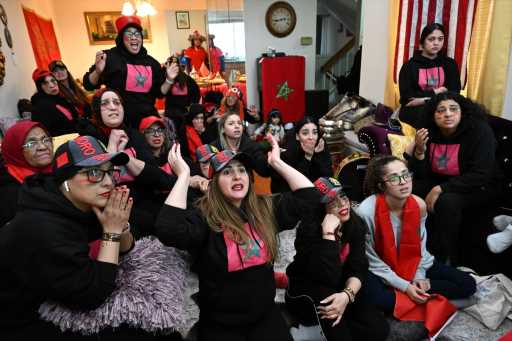Moroccan women work to change perceptions through World Cup
The red Moroccan flag with its green star could be seen in every corner of the townhome, on the walls, on accessories and even on a cake displayed on a table. The women wore black sweatshirts with the flag on the front and their names written in Arabic in red on the back. They had green and red stripes painted on their faces and wore caps that said Morocco on them.
Nearly 30 Aurora and Denver women and a few children had gathered Wednesday afternoon to watch the semifinal game in the World Cup to cheer on Morocco in the soccer match against France. The game was historic — it was the first time an African and an Arab team had made it this far, and it connected them to their culture and communities.
“It’s our Cinderella story,” Hanadi Elmrini said. “Nobody expected it.”
The group of friends prayed, sang, played traditional instruments and cheered their team (“yallah, go, go!”) for more than two hours. Even after Morocco lost 0-2, they stood up, and recited the Moroccan pledge of allegiance in unison, with that flag and the American flag behind them.
“We lost today, but they made us so proud. … We have a big heart. We’re people that don’t give up. We work so hard,” Elmrini sasid.
It was Assia Darif’s turn to host the group for Wednesday’s game. Many of the women took off work or school to watch a game that was about much more to them than just soccer.
“We always get together, but this is special,” Darif said.
Lina Belaissaoui left her Aurora high school classes early on Wednesday so she could make it. Even as she watched the end of the game, with tears streaming down her face, she couldn’t help but smile as she talked about how proud she was of the team.
Belaissaoui was born in Colorado, but she still has family in Morocco and holds her Moroccan heritage close to her heart. She came to watch the game with her older sister and her mom.
“It’s a big cultural thing for people,” she said, “staying connected back home even though you’re really far away.”
That’s why Fedoua Bouhamidi came up with the idea for the sweatshirts for the group, which initially started as four friends and continued to expand over the years. As the group expanded, so did the women’s activities and they wanted to spread the word about their event.
It wasn’t just about Morocco, though — which Darif said more people know about now, thanks to the World Cup, including how “we have the best food,” she said.
They’re also “trying to change how (other people) see Muslim women,” Hanane Ghiwane said.
Ghiwane, who works for the African Community Center in Aurora as a school liaison, said people often assume a Muslim woman wearing a hijab — the head covering — is being abused and controlled by a man, which couldn’t be further from the truth. Some of the women who called off work for the day to watch the game together, for example, left their kids at home with their husbands, or as Bouhamidi noted, are strong single women.
Ultimately, they hope Morocco’s rankings in the World Cup will encourage people to learn more about a culture and religion they didn’t know much about.
Morocco will have one more opportunity to play in the World Cup against Croatia on Saturday, competing for third place.
Source: Read Full Article




